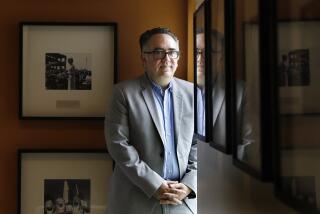9/11 Reforms Will Restrict Freedoms, ACLU Chief Says
- Share via
INDIANAPOLIS — Restrictions on civil liberties adopted after last year’s terrorist attacks could persist for many years, the executive director of the American Civil Liberties Union said Saturday.
“This is really about deciding what type of country we want to live in,” Anthony Romero said. “This is about nothing less than core American values.”
Speaking at the annual dinner of the Indiana Civil Liberties Union, Romero said much of the public is unaware that some rules enacted after the attacks on the World Trade Center and the Pentagon set legal precedents.
“Most are not going away until we make them go away,” he said.
Since the Sept. 11 attacks, the government has substantially expanded its ability to investigate and detain citizens, including giving itself the authority to hold people indefinitely without charges and giving law enforcement easier access to Americans’ personal lives.
The ACLU plans to file lawsuits related to the reforms and hopes to educate the public about the importance of civil liberties in times of crisis, Romero said.
“This is no time to despair or to become hysterical,” he said. “This is the time and the place and the opportunity to carefully lay the groundwork for an eventual swing of the pendulum.”
“What I want most is for the American public and elected representatives to have a robust debate on issues. That debate has largely not happened in the first year and is only beginning to happen now.”
Last year the ACLU experienced the largest jump in membership in its 82-year history, Romero said.
Legal experts are divided about the attacks’ effect on civil liberties.
Richard Garnett, an associate law professor at Notre Dame University, said government leaders have shown restraint.
“My view is that the civil liberties story after 9/11 is not all the abuses and all the limitations, because I don’t believe there have been significant abuses or abridgments,” Garnett said.
Robert Levy, a scholar at the Cato Institute, a Washington think tank, said many new regulations may be unnecessary.
“There are just a number of areas where civil liberties have been compromised too extensively,” Levy said, “particularly given what we’ve gotten in return.”
More to Read
Sign up for Essential California
The most important California stories and recommendations in your inbox every morning.
You may occasionally receive promotional content from the Los Angeles Times.










